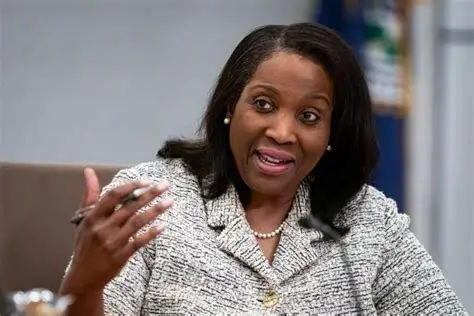Supreme Court Keeps Fed Governor Lisa Cook in Post as Trump Firing Bid Faces Review

The United States Supreme Court has temporarily blocked President Donald Trump from removing Federal Reserve Governor Lisa Cook, setting the stage for a historic legal showdown over central bank independence.
In an order released Wednesday, the justices said they will hear oral arguments in January on whether the president has the authority to fire a sitting Fed governor. Until then, Cook will remain in her position on the powerful seven-member Board of Governors, which plays a critical role in setting U.S. monetary policy.
The dispute marks the first attempt by any president to remove a Federal Reserve governor, breaking more than a century of precedent since the Fed’s creation in 1913. It also raises far-reaching questions about the balance of power between the White House and the institution designed to operate independently from political influence.
The White House has sought to remove Cook since August, when Trump accused her of falsifying mortgage records prior to her appointment in 2022. Cook, who was nominated by former Democratic President Joe Biden, has denied the allegations and argued that her removal would undermine the central bank’s independence and credibility.
On September 9, U.S. District Judge Jia Cobb issued an injunction preventing Trump from immediately ousting Cook. The judge ruled that the allegations of mortgage fraud did not appear to meet the threshold of “for cause” removal under the Federal Reserve Act. That law permits governors to be removed by a president only for cause, but it does not define the term or establish clear procedures for dismissal.
The Justice Department, representing the administration, appealed Cobb’s ruling and urged the Supreme Court to allow Cook’s removal while the case proceeds. The justices declined, instead opting to maintain the status quo until a full hearing is held in January.
The stakes are high for both the administration and the central bank. If the court sides with Trump, future presidents could potentially exert direct control over the Federal Reserve by threatening the tenure of its governors, eroding the independence that has long been considered essential to its credibility.
Cook’s defenders argue that her removal would set a dangerous precedent, opening the door to political interference in monetary policy. Economists warn that such a shift could rattle financial markets and undermine confidence in U.S. institutions at a time when economic stability is already under strain.
Trump, however, has maintained that no official should be beyond accountability and insists the allegations against Cook are grounds for dismissal. The White House has framed the case as a matter of integrity in public office, while critics describe it as a political power play aimed at reshaping the Fed’s leadership.
Cook, an economist with decades of academic and policy experience, was confirmed to the Fed in 2022 and is the first Black woman to serve as a governor. Her current term runs until 2038, underscoring the long-term impact of the court’s decision on the institution’s future.
The legal challenge comes as the Federal Reserve continues its delicate balancing act in managing inflation, interest rates, and economic growth. With the central bank at the center of debates over housing, employment, and lending, the outcome of the case could affect more than just institutional governance.
Observers note that the Supreme Court has rarely been asked to weigh in on the Federal Reserve’s internal operations. The ambiguity of the 1913 law leaves the justices with significant discretion to define the limits of presidential power over the Fed.
The case also highlights broader tensions between Trump and institutions seen as independent. His administration has clashed with the judiciary, regulatory agencies, and now the central bank, testing long-held norms about the separation of political authority from technical governance.
Market analysts say the Supreme Court’s decision to leave Cook in place for now offers short-term reassurance to investors, who had feared sudden disruption at the Fed. Still, the uncertainty surrounding the case ensures that January’s hearing will be closely watched in Washington and on Wall Street.
For the Federal Reserve, the dispute represents more than a personnel matter. It is a fundamental test of whether its leaders can continue to operate without fear of political retaliation, a principle that has underpinned U.S. monetary policy for more than a century.
Until the justices issue a final ruling, Lisa Cook remains on the board, carrying out her duties while awaiting a legal battle that could redefine the relationship between the White House and the nation’s central bank.










